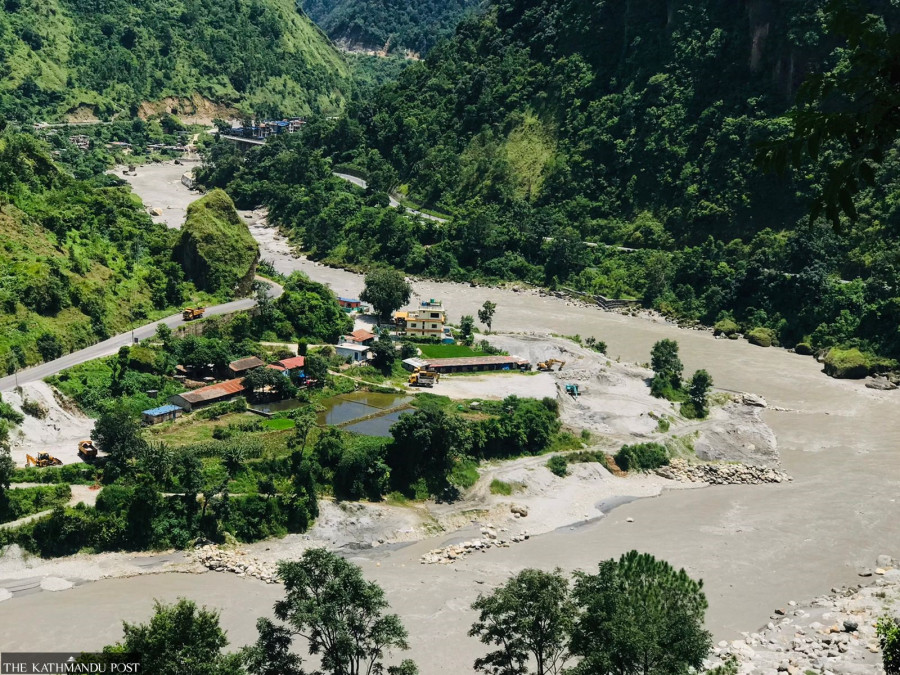Nepali Diaspora
Illegal mining goes on in Kaligandaki river under cover of darkness—right under authorities’ noses
Unable to stop extractions, local officials and district administration blame each other instead of taking responsibility.
Suman Jung Thapa
Despite a nationwide ban on the extraction of riverbed materials during the monsoon season, illegal mining of sand, gravel and stones continues unabated in the Kaligandaki river. Heavy machinery is being used at night to extract river materials even during peak flooding season, in direct violation of environmental regulations.
The government prohibits extraction of riverbed materials from mid-June to mid-September, but extraction goes unchecked in the areas like Jalkini, Nayapul, Sahasradhara, Gopangghat, Rajakobagar among other places in Kushma Municipality. Similarly, illegal extraction has been reported in Khaniyaghat, Pharse, Kerabari, Milan Chowk and Baribeni in Jaljala Rural Municipality as well. Local people in Phalebas Municipality and Modi Rural Municipality also complain about the nighttime extraction of riverbed materials.
“I had heard that extracting sand and gravel during the monsoon was illegal. But the JCB machines dance all night and the police seem blind to it,” said a local resident of Nagliwang, claiming that even the local government officials are involved in the illegal extraction. “Some of our neighbours have taken money to keep quiet. During the dry season, the authorities pretend to monitor. But in monsoon, when river deposits are high, everything is fixed through backdoor deals,” he added.
Netra Prasad Paudel, chief administrative officer of Kushma Municipality, admitted to ongoing illegal mining. He said the municipality has repeatedly written to the District Administration Office, District Coordination Committee and the police requesting monitoring and enforcement of the existing legal provisions. “We don’t have our own municipal police. So we rely on Nepal Police. Once, we even joined the Chief District Officer during a field visit and handed some offenders over to the police,” said Paudel.
On July 13, 2021, the Supreme Court had issued an interim order halting all mining activities in the Kaligandaki river within Gandaki and Lumbini provinces. The court order specifically banned any actions that altered the natural flow or beauty of the river, including damming, extraction of Shaligrams (fossilised ammonite stones primarily found in the Kaligandaki river in Nepal) and export of river materials until a final verdict was reached on the related writ petitions.
Due to the court’s interim order, the local units had been unable to issue any extraction contracts for four years. However, a joint bench of Justices Kumar Chudal and Binod Sharma dismissed the petition in October, 2023, opening the door for legal mining operations. Jaljala Rural Municipality was the first to announce fresh tenders. Kushma Municipality plans to open bids after the monsoon, according to Paudel.
Chief District Officer of Parbat Hari Prasad Adhikari said that his office takes the issue seriously. “No one is allowed to operate heavy machinery in the river during monsoon. We’ve stopped what we knew of, and we’ll hold a meeting with the District Coordination Committee as soon as its chief, who is out of the district now, returns,” said Adhikari. He, however, pointed out that ultimate responsibility for enforcement regarding the riverbed materials lies with local governments.
The frequent movement of tipper trucks and piles of sand along the highway offer visible evidence of ongoing illegal extraction. However, Bishnu Ram BK, chief of the District Coordination Committee in Parbat, downplayed the issue, calling the reports “just rumours.” Yet the reality on the riverbanks tells another story.




 23.14°C Kathmandu
23.14°C Kathmandu
















